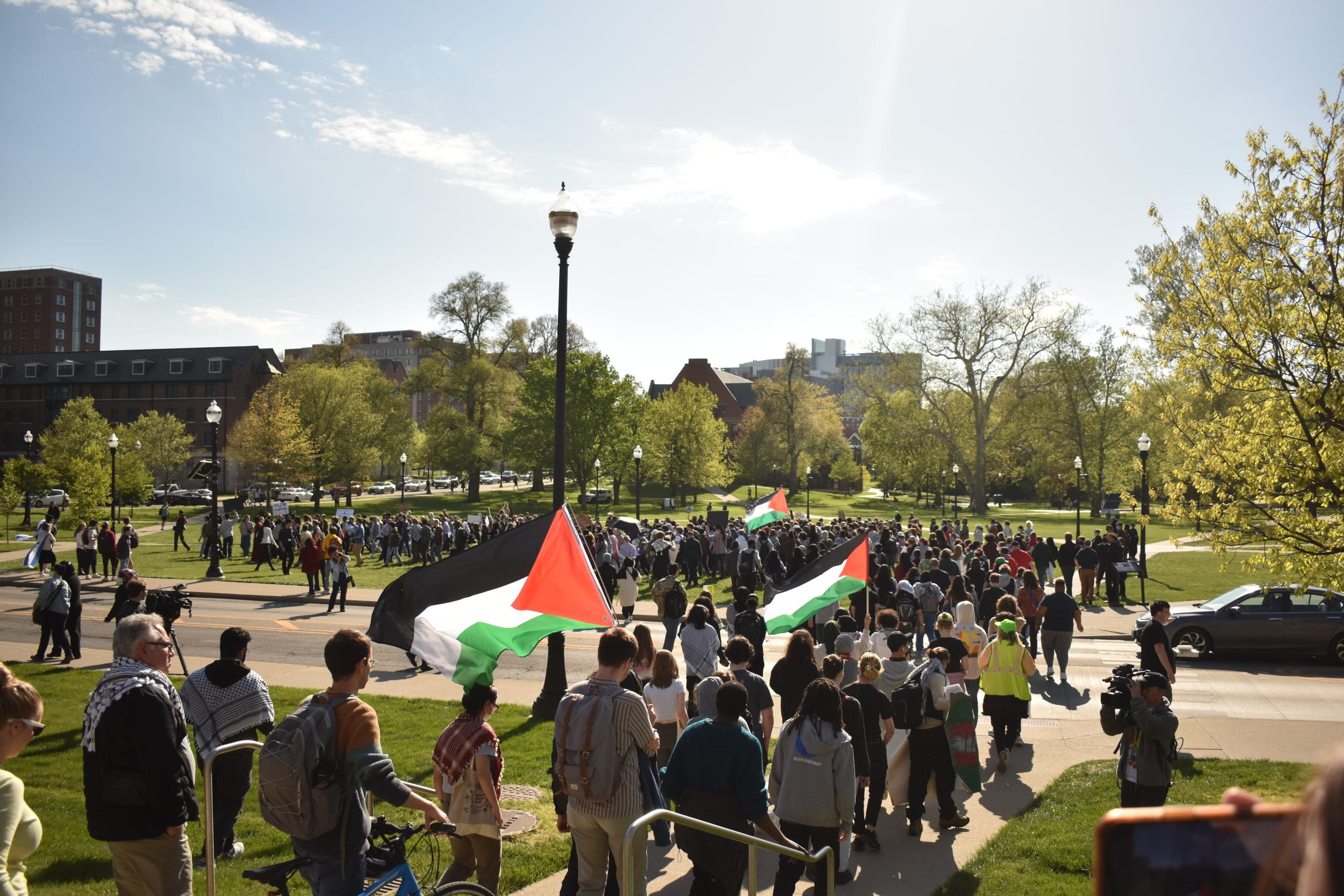
On Thursday, April 25, protesters marched from the Ohio Union to the South Oval. Credit: Arianna Smith | Editor-in-Chief
In the wake of Thursday evening’s pro-Palestinian protest that saw 36 people arrested, including 16 students, the Ohio State University Association of University Professors — also known as AAUP-Ohio State — released a statement Saturday condemning Ohio State’s administration.
The statement claims the university’s use of law enforcement to suppress “peaceful, nonviolent student protest” on Tuesday — during a protest in which two students were arrested — and Thursday, goes against the First Amendment principles of freedom of assembly and speech.
“Students — especially students at a public university — have the right to gather and protest without being charged with ‘criminal trespassing,’” the statement reads. “A university administration that touts its defense of students’ safety at every opportunity is being utterly hypocritical when it clamps down — as has repeatedly happened in the last several months — on speech it does not like, in violent and unnecessary ways.”
With this statement, AAUP-Ohio State has joined a growing list of organizations speaking out against the university, including the Undergraduate Student Government and Muslim Students’ Association.
AAUP-Ohio State’s statement goes on to accuse the university of being biased against pro-Palestinian speech and says the condemnation of such speech allowed for “repressive police actions” to be taken against student activists.
“The ground for the repressive police actions of the past few days was already prepared by Ohio State earlier this week though its public statements. Ohio State’s April 20, 2024 tweet and a subsequent campus-wide email by Ohio State President Ted Carter characterized pro-Palestine speech as a public disturbance and — worse — as “harassment,” dangerous, and biased,” the statement reads. “We condemn this characterization as itself dangerous and find it unworthy of an institution committed to clear thought, mutual respect, and the safety of all of its community members.”
AAUP-Ohio State also accused the university of “setting new boundaries” in regard to the university’s space rules, which have been used by the university as grounds for Tuesday’s and Thursday’s arrests, as well as the dispersal of Thursday’s protests.
After two protesters were arrested Tuesday, university spokesperson Ben Johnson said “Ohio State has an unwavering commitment to freedom of speech and took this action in alignment with our space use rules to provide for the orderly conduct of university business.”
AAUP-Ohio State called this statement “illogical.”
“We find this statement illogical, and we are alarmed by the shifting goal posts of what counts as a proper space in which to speak at Ohio State, and what does not. This is an attempt to set new boundaries that will curtail the open, peaceful exchange of ideas and knowledge,” the statement reads.
The national AAUP President Irene Mulvey released a statement Wednesday denouncing the “crackdown on peaceful dissent” occurring at Columbia, New York University and other colleges nationwide.
“Higher education is premised on full and free discussion and debate of all ideas. Summoning armed police officers in order to silence debate and suppress speech that poses no genuine threat to campus safety is a danger to democracy,” Mulvey said in the statement.
University presidents are appealing to congressional pressure rather than working to protect academic freedom, Mulvey said.
“By capitulating to ongoing congressional pressure instead of providing a full-throated defense of academic freedom, university presidents have failed in their duty to protect the autonomy of academic and intellectual life from outside interference,” Mulvey said. “By asserting that peaceful protesters are ‘trespassing,’ the administration gives credence to controversial definitions of antisemitism that are, as the AAUP cautioned in 2022, overly expansive and a threat to academic freedom.”
In response to AAUP-Ohio State’s claims, Johnson said “Ohio State’s longstanding space rules are content neutral, and the university has enforced the rules uniformly.”
“The university is not limiting individuals’ right to ‘gather and protest’ or ‘shifting goal posts of what counts as a proper space in which to speak,’” Johnson said. “Rather, the university is uniformly enforcing space rules regarding overnight events, restricted noise and other matters.”


